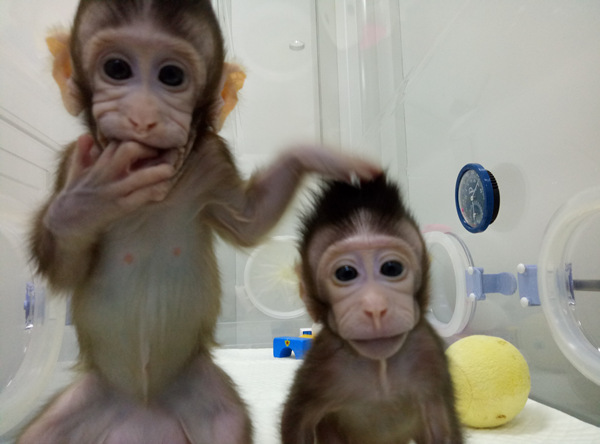
The two cloned macaques, named Zhong Zhong and Hua Hua (Photo provided to Ecns.cn)
China on Thursday announced it successfully cloned world' s first macaques from somatic cells by method that made Dolly. It makes research with customizable populations of genetically uniform monkeys a possibility.
The two cloned macaques, named Zhong Zhong and Hua Hua, were produced at the non-human-primate research facility under the Chinese Academy of Sciences (CAS) at the end of 2017. A third is due this month and more this year, said scientists.
The initial research was published on the website of the scientific journal, Cell.
Since Dolly the sheep was successfully cloned from an adult cell in 1997, other mammals have also been cloned, but macaques, which are closely related to humans, have been a challenge.
Sun Qiang, director of the CAS non-human-primate research facility, led a group of researchers for three years to overcome the biological difficulties.
Zhong Zhong and Hua Hua are the product of somatic cell nuclear transfer (SCNT), the technique used to create Dolly the sheep over 20 years ago.
Researchers edited genes in vitro and accurately sifted and produced somatic cells with the same genotype. They removed the nucleus from an egg cell and replaced it with another nucleus from differentiated body cells.
The reconstructed eggs produced embryos, which were put into the wombs of surrogate female monkeys, producing a group of cloned monkeys with the same genetic background.
The first author Liu Zhen, a postdoctoral fellow, spent three years practicing and optimizing the SCNT procedure. He tested various methods to quickly and precisely remove the nuclear materials from the egg cell and promote the fusion of the nucleus-donor cell and enucleated egg.
"The SCNT procedure is rather delicate, so the faster you do it, the less damage to the egg you have, and Dr. Liu has a green thumb for doing this," said Sun.
This success means China will pioneer in disease and brain science research by taking cloned macaques as animal models, said Muming Poo, a co-author on the study who directs the Institute of Neuroscience of CAS Center for Excellence in Brain Science and Intelligence Technology.
"This is a key development in studying primate biology and making models of non-human primates," said Bai Chunli, president of the CAS.
The models designed for brain diseases will shed light on their study, intervention and even treatments.


















































